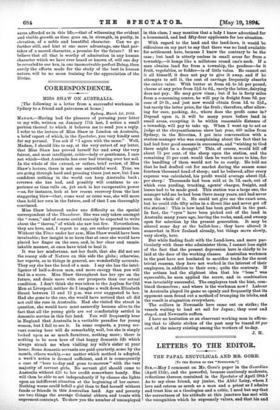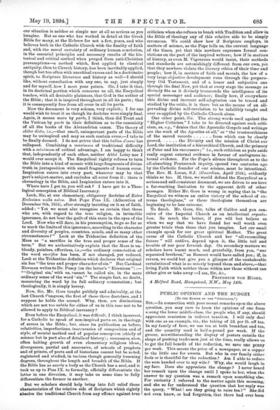LETTERS TO THE EDITOR.
THE PAPAL ENCYCLICAL AND MR. GORE: [To THE EDITOR OF THE "SPECTATOR."] SIR,—May I comment on Mr. Gore's paper in the Guardian (April 11th), and the powerful, because cautiously moderate, reflections thereon contained in the Spectator of April 28th? As to my close friend, my junior, the Alah6 Loisy, whom I love and esteem as much as a man and a priest as I admire and trust him as a theologian and a critic, I need but say that the correctness of his attitude at this juncture has met with the recognition which he supremely values, and that his and
our situation is neither so simple nor at all so serious as you imagine. Bat as one who has worked in detail at the Greek Bible for many, at the Hebrew for not a few, years, and who believes both in the Catholic Church with the finality of faith and, with the moral certainty of ordinary human conviction, in the essential principles and necessary results of the his- torical and critical method when purged from anti-Christian presumptions—a method which, first applied to classical antiquity, then to Church history, has been inevitably applied, though but too often with uncritical excess and in a doctrinaire spirit, to Scripture literature and history as well—I should like, without consultation with any one, to say, just simply and for myself, how I meet your points. Sir, I take it that, in its doctrinal portion which concerns us all, the Encyclical teaches, with all desirable plainness, that God is the author of the Bible ; that it is inspired throughout in all its parts ; that it is consequently free from all error in all its parts.
Now the document is very solemn, very explicit; I for one would wish to treat it as though its doctrine were simply finaL Again, it means more by parts, I think, than did Trent and the Vatican by parts in their definition as to the canonicity of all the books of the Alexandrian canon. The theory of obiter dicta, i.e.,—tbat small, unimportant parts of the Bible may be uninspired and may as such contain error,—I take to be finally doomed. I do not grieve that this ballon d'essai has collapsed. Combining a maximum of traditional difficulty with a minimum of critical advantage, I am happy to think that, independently of each other, neither Abbe Loisy nor I would ever accept it. The Encyclical rightly refuses to turn the Bible into a kind of mosaic with large fragments of divine truth in juxtaposition with small fragments of human error. Inspiration enters into every part, whatever may be that part's subject-matter, and excludes all error from it : there is chronology in the Bible, and Inspiration enters into it.
Where have I got to, you will ask ? I have got to a Theo- logical conception of Biblical Inerrancy.
Look, Sir, at our elementary, obligatory doctrine of Extra Ecclesiam nulla sales. But Pope Pins 1X. (Allocution of December 9th, 1854), after strongly insisting on it as of faith, added : "Yet we must also recognise as certain that those who are, with regard to the true religion, in invincible ignorance, do not bear the guilt of this state in the eyes of the Lord. Now who will dare, in his presumption, to go so far as to mark the limits of this ignorance, according to the character and diversity of peoples, countries, minds, and so many other circumstances?" Look at the Tridentine definition of the Mass as "a sacrifice in the true and proper sense of the term." Bat we authoritatively explain that the Mass is un- bloody, painless, effortless, i.e.,—the ordinary connotation of the word sacrifice has been, if not changed, yet reduced. Look at the Tridentine definition which declares that original sin has "the true and proper character of sin." But Cardinal Newman writes to Dr. Pusey (on the latter's " Eirenicon ") :— "'Original sin,' with us, cannot be called sin, in the mere ordinary sense of the word sin." The simple fact, no doubt, measuring the word by its full ordinary connotation ; but theologically, it is simply heresy.
Now, Sir, Mr. Gore taught publicly and admirably, at the last Church Congress, the first of these three doctrines, and I suppose he holds the second. Why, then, are distinctions which are not too subtle for either of us in this case not to be allowed to apply to Biblical inerrancy ?
Even before the Encyclical, it was difficult, I think incorrect, for a Catholic to speak of non-inspired parts or, in theology, of errors in the Bible ; but, since its publication as before. relativities, imperfections, inaccuracies of composition and of style, of mental method and of popular conception (chiefly of science but in part also of details of history); successive, slow, often halting growth of even elementary religions ideas divergences, partial and successive, of schools of prophets and of priests, of poets and of historians cannot but be noted, registered and studied, in various though generally lessening degrees, throughout the length and breadth of the Bible. If the Bible has as surely a body as the Church has a soul, and it took us up to Pius IX. to formally, officially differentiate the latter in one direction, it may take us some time to fully differentiate the former in another.
But we scholars should help bring into full relief those characteristics of the relative side of Scripture which rightly Mutelve the traditional Church from any offence against true criticism when she refuses to break with Tradition and allow in the Bible of theology any of this relative side to be simply erroneous. We could show how if Scripture employs, in matters of science, as the Pope tells us, the current language of the times, yet that this nowhere expresses formal con- victions on the part of the inspired writers ; how if in matters of history, as even M. Vigouroux would insist, their methods and standards are astonishingly different from our own, yet that they nowhere violate the literary ethics of their time and people; how if, in matters of faith and morals, the law of a very large objective development runs through the prepara- tory Old Testament, and of a lesser and subjective one through the final New, yet that at every stage the message as divinely fits- as it divinely transcends the intelligence of its special messenger and audience ; finally how, if everywhere this divine and inerrant self-adaptation can be traced and studied by the critic, it is there but as the means of an alb pervading divine self-revelation to be infallibly taught and. ever re-applied by the Catholic Church alone.
One other point, Sir. The strong words used against the "Higher Criticism" I take to be directed against such criti. clam, as, e.g., "denies that the Apostolic Gospels and writings are the work of the Apostles at all," or "the trustworthiness
of the sacred records from which can be clearly proved. the Divinity and the mission of Christ our
Lord, the institution of a hierarchical Church, and the primacy of Peter and his successors ; " i.e., such criticism as puts aside really cogent external evidence in favour of ambiguous in- ternal evidence. For the Pope's silence throughout as to the all-absorbing Pentateuch inquiry, opened two centuries ago by the Catholic founder of our science, must be intentional. The Rev. H. Lucas, S.J. (Guardian, April 25th), evidently thinks so too. If, then, we would defend the Encyclical as a serious and self-consistent document, we are driven to see here a far-reaching limitation to the apparent drift of other passages. Either Mr. Gore is wrong in saying that in "the Encyclical we witness an entire victory of the school of ex- treme theologians," or these theologians themselves are beginning to be less extreme.
To finish. Mr. Gore, Sir, talks of Galileo and you con- ceive of the Imperial Church as an intellectual ergastu- lum. So much the better, if you will but believe us when we say that we have found her well worth even greater trials than those that you imagine. Let our small example speak for our great spiritual Mother. The great cause of the Catholic Church and her "all-reconciling future" will outlive, depend upon it, the little toil and trouble of our poor feverish day. On secondary matters we scholars have learnt much, and gratefully, from you, "our separated brethren," as Bossuet would have called you; if, in return, we could bat give you a glimpse of the unshakeable certainties of what is so utterly beyond them and above,—that living Faith which neither those within nor those without can either give or take away.—I am, Sir, &c.,







































 Previous page
Previous page